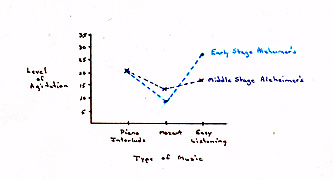| Source | SS | df | MS | F |
| Type of Music | 740 | 2 | 370.00 | 49.89 |
| Degree of Alzheimer's | 30 | 1 | 30.00 | 4.05 |
| Music x Alzheimer's | 260 | 2 | 130.00 | 17.53 |
| Within | 178 | 24 | 7.42 | |
| Total | 1208 | 29 | ||

Test results show that there is a significant main effect for type of music (F=48.89 (2,24), p<.01). However, it appears that there is no significant difference in agitation levels between early and middle stages of Alzheimer's disease (F=4.05 (1, 24), not significant). There is however a significant interaction effect (F=17.53 (2,24), p<.01).
Without post hoc tests, it is not possible to know exactly where the significant differences lie specifically. However, it appears from the graph that patients in both the early and middles stages of Alzheimer's disease experience significantly less agitation while listening to Mozart. Patients in the early stages of Alzheimer's disease exhibited the greatest agitation while listening easy listening musci and patients in the middle stages of Alzheimer's disease exhibited the greated agitation while listening to piano interludes.